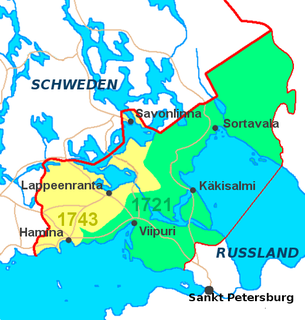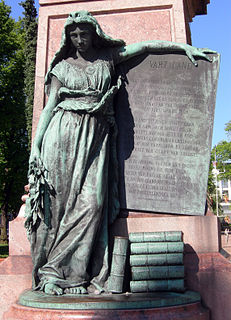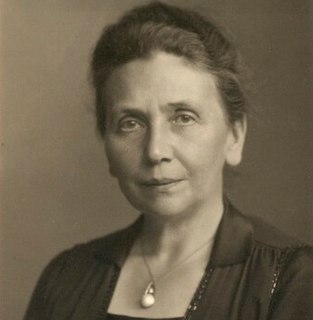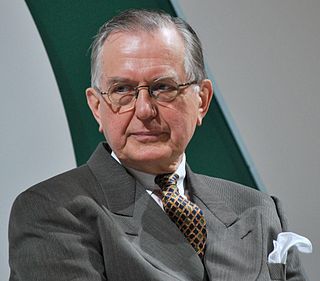
Turku is a city on the southwest coast of Finland at the mouth of the Aura River, in the region of Southwest Finland (Varsinais-Suomi). Turku, as a town, was settled during the 13th century and founded most likely at the end of the 13th century, making it the oldest city in Finland. It quickly became the most important city in Finland, a status it retained for hundreds of years. After Finland became part of the Russian Empire (1809) and the capital of the Grand Duchy of Finland was moved to Helsinki (1812), Turku continued to be the most populous city in Finland until the end of the 1840s, and it remains a regional capital and an important business and cultural center.

Mikael Agricola was a Lutheran clergyman who became the de facto founder of literary Finnish and a prominent proponent of the Protestant Reformation in Sweden, including Finland, which was a Swedish territory at the time. He is often called the "father of literary Finnish".
The Russo–Swedish War of 1741–1743, known as the Hats' Russian War in Sweden and the War of the Hats in Finland, which resulted in the Lesser Wrath, or the occupation of Finland, was instigated by the Hats, a Swedish political party that aspired to regain the territories lost to Russia during the Great Northern War, and by French diplomacy, which sought to divert Russia's attention from supporting its long-standing ally, the Habsburg monarchy, in the War of the Austrian Succession.
The Language Strife was a major conflict in mid-19th century Finland. Both the Swedish and Finnish languages were commonly used in Finland at the time, associated with descendants of Swedish colonisation and leading to class tensions among the speakers of the different languages. It became acute in the mid-19th century. The competition was considered to have officially ended when Finnish gained official language status in 1923 and became equal to the Swedish language.

The Treaty of Åbo or the Treaty of Turku was a peace treaty signed between the Russian Empire and Sweden in Turku on 7. Augustjul./ 18. Augustgreg. 1743 in the end of the Russo-Swedish War of 1741-1743.
Finland declared its independence on 6 December 1917. The formal declaration of Independence was only part of the long process leading to the independence of Finland.

The Diocese of Tampere is the second oldest and the largest diocese in the Evangelical Lutheran Church of Finland. It is divided into 69 parishes with a total population of over 660,000 people. The diocese is led by the Bishop of Tampere.
The attempt to create a Kingdom of Finland in 1742 is a little-known chapter in the history of Finland. Following the Russian occupation in the Russo-Swedish War (1741–1743) and vague promises of making the country independent, Finns elected the then Duke Peter of Holstein-Gottorp as the King of Finland. However, the political situation had outgrown the idea of Finnish independence and it quickly evaporated.

Ulla-Lena Lundberg is a Finland-Swedish author living in Porvoo, Finland. Her Swedish language books have been translated into several languages, including Finnish, Danish, German, Russian and Dutch.
Rev Dr John Paterson DD (1776–1855) was a Scottish missionary in Scandinavia and the Russian Empire. He earned his doctorate from the University of Abo and was instrumental in the operation of the Russian Bible Society for several years eventually being pensioned by Czar Nicholas I. He returned to Edinburgh, where he served as secretary for Scotland of the London Missionary Society.
The governorates of the Grand Principality of Finland were the administrative division of the Grand Principality of Finland as part of the Russian Empire from 1809 to 1917.

Women in Finland enjoy a "high degree of equality" and "traditional courtesy" among men. In 1906, the women of Finland became the first women in Europe to be granted the right to vote. There are many women in Finland who hold prominent positions in Finnish society, in the academics, in the field of business, and in the government of Finland. An example of powerful women in Finnish politics is Tarja Halonen, who became the first female president of the country. In religion, where most of the Finnish people are members of the Evangelical Lutheran Church of Finland, women can be ordained as priests. In terms of finance, Finnish women have been described as "usually independent financially". Married women, by custom, introduces themselves by mentioning their forename first, then their maiden name, and then the surname of their husbands. The Telegraph has written:
Finnish women are much more outgoing and approachable than the men and often command three or four languages. Their position in society and business is well-respected and superior to that of women in most other cultures.
Ulrika Fredrika Bremer, née Salonius, was a ship owner and merchant in Swedish Finland. She was the paternal grandmother of Fredrika Bremer. After the death of her husband Jacob Bremer in 1785, at the age of 39, she took over his businesses and ships in Åbo. She successfully managed his business empire over 13 years and was one of the richest Finnish women of her time.
Catharina Margareta Torenberg, also referred to as Katariina Torenberg-Annell, was a Finnish violinist.

Events from the year 1723 in Sweden

Robert Magnus Dahlström was a Finnish businessman and philanthropist.
Jacob or Jakob Bremer was a Swedish merchant and industrialist.
Fredrique Eleonore Baptiste, was a Swedish stage actress and playwright active in Finland. She belonged to the star attractions of the Finnish theater in the early 19th-century, when theater in Finland was performed by travelling Swedish language theaters. Her plays where successful among travelling theater companies in both Finland and Sweden during the 19th-century.

Eva Elisabeth Moltesen née Hällström (1871–1934) was a Finnish-Danish writer and peace activist. In 1896, she moved to Denmark to continue her education, married a Dane and settled there. She published her literary works in both Finnish and Danish, introduced Danes to her native Finland through a series of lectures and established a Finnish Society in Copenhagen. She also created Finnish-Danish and Danish-Finnish dictionaries. In 1915, Moltensen was one of the founding members of Danske Kvinders Fredskæde, the Danish chapter of the Women's International League for Peace and Freedom. In 1918, representing Venstre, she was a candidate in the national elections but was not elected.













